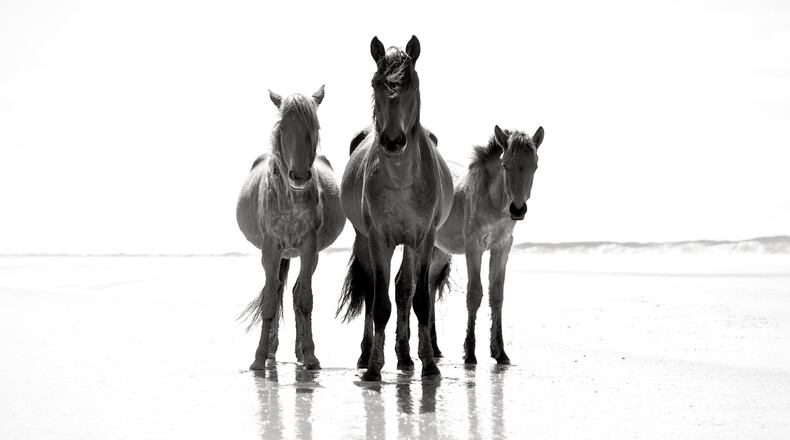Cumberland Island off the coast of Georgia is home to the only unmanaged feral herd of horses on the east coast. For 10 years, photographing the horses has been the project of Connecticut-based photographer Anouk Masson Krantz, who made frequent trips to the island to capture images of the wild animals in their environment.
“Cumberland is such an unbelievable place,” says Krantz, whose photographs were recently published in the coffee-table book “Wild Horses of Cumberland Island” (Images Publishing). “There’s a sense of mystery and magic that exists there that I had never experienced anywhere else. There’s a sense of wonder and awe everywhere you turn.”
The sea island, now protected as the Cumberland Island National Seashore and accessible only by boat, is home to about 18 miles of empty, uninterrupted white sand beaches, a vast dune system, and unspoiled maritime forest with razor-sharp palmettos and a canopy of magnificent old oaks dripping with elegant Spanish moss.
But it was the horses that intrigued Krantz the most from the moment she first encountered them on her initial visit to the island in 2004.
“I was just sitting on the beach,” she recalls. “I suddenly felt the presence of someone behind me. I turned around and they were standing right there. It was such an unbelievable moment. They were so calm, and we looked at each other. I could relate to them. That’s when I captured the image of those three horses on the beach. We looked at each other, and it was really just a wonderful moment.”
She has since visited the island more than 25 times.
Krantz lives in Darien, Connecticut, with her husband and two children, 10 and 11. Raised in France, she got her first camera when she was 5.
“I always had a camera in my hands when I was younger,” she says. “We moved quite a bit when I was a child, every four years for my dad’s job. The constant things I found wherever we went were my camera and horseback-riding.”
Krantz eventually developed a career as an award-winning photojournalist, but when her two children were born, it was hard for her to continue working. Occasionally visiting Cumberland Island while the children stayed with their grandparents in Savannah provided a much-needed respite from the modern world, as well as the opportunity to take photographs.
“The island is an ideal escape from the madness of modern life, a place where outside pressures disappear,” she says. “It’s an amazing contrast with my life in the Northeast. The reason I went back is it gave me a better perspective on life. It kept me grounded.”
For her early visits, Krantz stayed in St. Mary’s and took the daily ferry to the island to photograph the horses, but she eventually befriended the owners of the Greyfield Inn, housed in the former residence of the Carnegie family on Cumberland Island and the only such accommodations on the island. She began staying with them.
Journeying to the island’s most remote places became her goal. Oftentimes, her trips yielded nothing.
“Many times I was very disappointed,” she says. “The horses weren’t around, and I didn’t really capture anything. But when you do capture these unbelievable moments, it’s very rewarding. And that’s why you go back again and again.”
Krantz says her many solitary daily hikes, which often lasted from dusk to dawn, took her far away from the island’s trickle of human traffic to the most remote areas where she was able to have close encounters with the horses.
“I never tried to get close to them,” she says. “They got close to me. I think there was a connection that people who are passionate about horses will understand. I felt very comfortable around them, and I think they felt the same thing. I just sat for a very long time, just waiting. Ultimately, they’re curious and they come toward you. Maybe it’s just for a split second, which is what happened most of the time.”
Legend has it that the horses arrived on the island in the 16th century with the arrival of the Spanish conquistadors. However, a more likely explanation is that the current population descended from horses brought to the island in the 18th century by the English. Although Cumberland and wild horses have become nearly synonymous in many visitors’ minds, some environmentalists argue the horses are bad for the island and its other wildlife, and that the island is not a healthy place for them to live. Discussions have lately turned to ways of humanely removing the horse population from the island.
Krantz couldn’t disagree more.
“The horses are one of the only links to the island’s history,” she says. “Concern for the horse population is simply a straw argument to justify opening up the island to more people. Those horses would be a very real threat to a much larger number of tourists. You do occasionally see an old horse, but that’s just part of nature. In any population of wildlife. there will be strong and weak individuals, young and old individuals, and eventually they will all die. It would become a very different island if they were removed.”
Regardless, Krantz says Cumberland will always remain a special place for her. Even though her project is now finished, she plans to continue visiting the island and photographing its horses for as long as she can.
“It’s like a second home to me,” she says. “I will always return because it’s such a beautiful place. I really hope that it stays as it is right now. It’s unspoiled, it’s untouched. There aren’t many places in the U.S. where you can go and find that.”
About the Author
Keep Reading
The Latest
Featured

